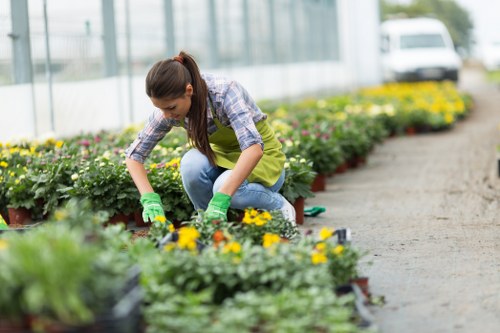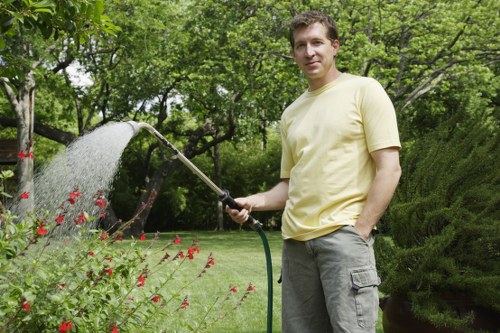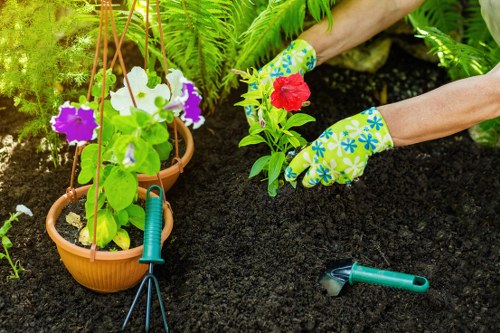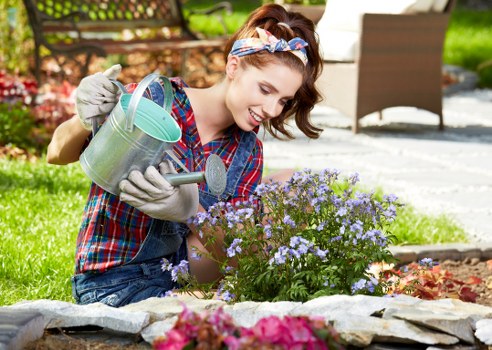Comprehensive Garden Maintenance in Blackfriars

Maintaining a beautiful garden in Blackfriars requires dedication, knowledge, and the right resources. Whether you are a seasoned gardener or a novice, understanding the essentials of garden maintenance can transform your outdoor space into a lush, vibrant sanctuary.
Blackfriars, with its unique climate and urban setting, presents specific challenges and opportunities for garden maintenance. From selecting the right plants to understanding seasonal care, this guide will walk you through everything you need to know to keep your garden thriving.
In this article, we will cover various aspects of garden maintenance, including soil preparation, planting techniques, pest control, and seasonal tasks. By following these guidelines, you can ensure that your garden remains healthy and attractive throughout the year.

Understanding the Climate and Soil of Blackfriars
Before diving into maintenance practices, it's crucial to understand the specific climate and soil conditions of Blackfriars. This knowledge will help you make informed decisions about plant selection and care routines.
Blackfriars experiences a temperate maritime climate, characterized by mild winters and cool summers. This climate is conducive to a wide variety of plants, but it's essential to choose species that can thrive in these conditions.
The soil in Blackfriars is predominantly clay-based, which can retain moisture but may also lead to drainage issues. Improving soil structure through the addition of organic matter can enhance plant growth and prevent waterlogging.

Essential Tools for Garden Maintenance
Having the right tools is fundamental to effective garden maintenance. Investing in quality equipment can save time and effort, making your gardening experience more enjoyable.
Some of the essential tools include:
- Pruning Shears: For trimming and shaping plants.
- Garden Fork: Ideal for loosening soil and removing weeds.
- Rake: Useful for clearing debris and leveling soil.
- Watering Can or Hose: Ensures plants receive adequate moisture.
- Gloves: Protect your hands while working.
Regular maintenance of these tools, such as cleaning and sharpening, will extend their lifespan and ensure efficient performance.

Plant Selection and Arrangement
Selecting the right plants is a cornerstone of successful garden maintenance. Choosing species that are well-suited to Blackfriars' climate and soil conditions will reduce the need for excessive care and increase the likelihood of a thriving garden.
Consider incorporating a mix of perennials, annuals, shrubs, and trees to create a diverse and resilient garden. Perennials offer long-term beauty, while annuals provide seasonal color.
When arranging plants, take into account their sunlight and shade requirements, water needs, and growth habits. Proper placement ensures that each plant can access the resources it needs without competing excessively with its neighbors.

Soil Preparation and Fertilization
Healthy soil is the foundation of a flourishing garden. Proper soil preparation involves testing soil pH, enriching it with organic matter, and ensuring good drainage.
Conduct a soil test to determine acidity levels and nutrient content. Based on the results, you can amend the soil with lime to raise pH or sulfur to lower it, creating an optimal environment for plant growth.
Adding compost or well-rotted manure improves soil structure, enhances fertility, and promotes beneficial microbial activity. Regular fertilization, using either organic or synthetic fertilizers, ensures that plants receive the nutrients they need to thrive.
Watering Techniques for Optimal Growth
Proper watering is vital for maintaining a healthy garden. Overwatering or underwatering can lead to a range of issues, from root rot to wilting and stunted growth.
Implementing efficient watering techniques, such as drip irrigation or soaker hoses, can provide consistent moisture while conserving water. Watering early in the morning reduces evaporation and allows plants to absorb moisture before the heat of the day.
Understanding the specific water needs of different plants is essential. Group plants with similar moisture requirements together to streamline your watering schedule and ensure that each plant receives adequate hydration.
Pest and Disease Management
Protecting your garden from pests and diseases is a critical aspect of maintenance. Early detection and intervention can prevent minor issues from escalating into major problems.
Regularly inspect plants for signs of pests, such as insects, mites, or fungal infections. Common pests in Blackfriars gardens include aphids, slugs, and caterpillars, while diseases may manifest as leaf spots, rust, or blight.
Adopt an integrated pest management (IPM) approach, combining biological controls like beneficial insects with mechanical methods such as traps and barriers. When necessary, use environmentally friendly pesticides to minimize harm to beneficial organisms and the broader ecosystem.
Pruning and Trimming for Health and Aesthetics
Regular pruning and trimming are essential for maintaining plant health and enhancing the visual appeal of your garden. Proper pruning encourages new growth, shapes plants, and removes dead or diseased branches.
Each type of plant has specific pruning requirements. For example, flowering shrubs may need to be pruned after blooming, while fruit trees benefit from winter pruning.
Using sharp, clean tools ensures clean cuts and reduces the risk of transmitting diseases. Always follow best practices for each plant type to achieve optimal results.
Seasonal Garden Maintenance Tasks
Different seasons bring unique challenges and opportunities for garden maintenance. Adapting your care routines to the changing seasons ensures continuous garden health.
Spring:
- Prepare soil by adding compost.
- Plant early spring flowers and vegetables.
- Prune dormant trees and shrubs.
Summer:
- Regularly water plants, especially during dry spells.
- Mulch to retain moisture and suppress weeds.
- Monitor for pests and diseases.
Autumn:
- Clean up fallen leaves and garden debris.
- Plant bulbs for spring blooming.
- Protect sensitive plants from frost.
Winter:
- Plan next year's garden layout.
- Prune evergreen shrubs lightly.
- Protect plants from extreme cold.
Mulching for Soil Health
Mulching is a simple yet effective garden maintenance practice that offers multiple benefits. It helps regulate soil temperature, retains moisture, and suppresses weed growth.
Organic mulches, such as bark, straw, or compost, enrich the soil as they decompose, providing nutrients to plants. Inorganic mulches, like gravel or plastic sheeting, offer long-lasting weed control and moisture retention.
Apply mulch evenly around plants, ensuring it does not touch the stems or trunks to prevent rot and disease. Replenish mulch as needed, especially after heavy rains or over time as organic materials break down.
Lawn Care and Maintenance
A well-maintained lawn adds aesthetic value and provides a versatile space for outdoor activities. Effective lawn care involves regular mowing, fertilizing, aerating, and managing pests.
Mow the lawn regularly to maintain an optimal height, which varies depending on the grass species. Avoid cutting more than one-third of the grass blade at a time to prevent stress.
Fertilize the lawn during the growing season to promote healthy growth. Aerate compacted soil to improve root development and enhance water and nutrient absorption.
Irrigation Systems for Efficient Water Use
Installing an efficient irrigation system can significantly reduce water waste and ensure consistent watering for your garden. Drip irrigation and sprinkler systems are popular choices for Blackfriars gardens.
Drip irrigation delivers water directly to the plant roots, minimizing evaporation and runoff. This method is ideal for vegetable gardens, shrubs, and flower beds.
Sprinkler systems are suitable for lawns and larger garden areas. Modern systems offer programmable controls, allowing you to customize watering schedules based on plant needs and weather conditions.
Composting for Sustainable Gardening
Composting is an eco-friendly garden maintenance practice that recycles organic waste into valuable soil amendments. By composting kitchen scraps, garden trimmings, and other biodegradable materials, you can create rich compost that enhances soil fertility.
Set up a compost bin or pile in a well-ventilated area. Maintain a balanced mix of green (nitrogen-rich) and brown (carbon-rich) materials, turning the pile regularly to promote decomposition.
Use the finished compost to enrich garden beds, improve soil structure, and provide a slow-release source of nutrients for plants.
Integrated Pest Management Strategies
Integrated Pest Management (IPM) is a holistic approach to controlling garden pests while minimizing environmental impact. IPM combines biological, cultural, mechanical, and chemical methods to manage pest populations effectively.
Biological controls include introducing natural predators, such as ladybugs and predatory beetles, to reduce pest numbers. Cultural practices, like crop rotation and selecting pest-resistant plant varieties, prevent infestations.
Mechanical methods involve physically removing pests or using barriers to protect plants. Chemical controls should be used sparingly and as a last resort, opting for low-toxicity options when necessary.
Creating a Year-Round Maintenance Schedule
Organizing garden maintenance tasks into a year-round schedule ensures that your garden receives consistent care and attention. A well-planned schedule helps in managing time effectively and addressing seasonal needs promptly.
Consider using a garden planner or digital calendar to track tasks such as planting, pruning, fertilizing, and pest control. Assign specific tasks to each month, adapting the schedule based on weather patterns and plant growth cycles.
Regularly review and adjust your maintenance schedule to accommodate changes in your garden's needs and personal availability.
Enhancing Garden Aesthetics with Decorative Elements
Incorporating decorative elements into your garden enhances its visual appeal and provides personalized touches. Features like garden paths, seating areas, sculptures, and lighting add character and functionality to your outdoor space.
Choose materials and designs that complement your garden's style and plant selection. For instance, a stone path can lend a natural look, while metal sculptures add modern flair.
Proper lighting not only beautifies the garden but also extends its usability into the evening hours. Select energy-efficient lighting options, such as LED fixtures, to illuminate pathways and highlight focal points.
Sustainable Practices for Eco-Friendly Gardening
Adopting sustainable practices in garden maintenance promotes environmental responsibility and contributes to a healthier ecosystem. Sustainable gardening minimizes resource use, reduces waste, and supports biodiversity.
Implement rainwater harvesting to collect and reuse water for irrigation. Use organic fertilizers and pest control methods to reduce chemical runoff and protect beneficial insects.
Encourage native plants that support local wildlife, including pollinators like bees and butterflies. Creating habitats for birds, insects, and other creatures enhances the garden's ecological balance.
Professional Garden Maintenance Services in Blackfriars
While DIY garden maintenance can be rewarding, enlisting professional services offers expertise and efficiency, especially for more extensive or complex gardens.
Professional garden maintenance companies in Blackfriars provide a range of services, including regular mowing, pruning, planting, and pest control. They have the knowledge and equipment to handle diverse garden needs effectively.
Hiring professionals ensures consistent care, allowing you to enjoy a well-maintained garden without the stress of managing every detail yourself. Consider reaching out to local experts to discuss customized maintenance plans tailored to your garden's specific requirements.
DIY Tips for Effective Garden Maintenance
For those who prefer a hands-on approach, here are some DIY tips to enhance your garden maintenance routine:
- Start Early: Begin maintenance tasks in early spring to set a strong foundation for the growing season.
- Stay Organized: Keep track of tools, supplies, and tasks to streamline your maintenance efforts.
- Educate Yourself: Continuously learn about gardening techniques, plant care, and sustainable practices.
- Practice Patience: Gardening requires patience and persistence. Allow time for plants to grow and respond to care.
- Seek Community: Join local gardening groups or online forums to share experiences and gain insights.
Implementing these tips can make garden maintenance more manageable and enjoyable, leading to a thriving outdoor space.
Maximizing Space in Blackfriars Gardens
Urban gardens in Blackfriars often contend with limited space. Maximizing available space involves creative planning and efficient use of vertical and horizontal areas.
Consider using trellises, pergolas, and vertical planters to grow climbing plants and utilize vertical space effectively. Container gardening is another excellent option for small areas, allowing flexibility in plant placement.
Strategic plant selection, such as choosing compact or dwarf varieties, helps in optimizing space without compromising on diversity and beauty.
Maintaining Garden Health Through Regular Inspections
Regular inspections are crucial for early detection of issues that may affect garden health. By routinely checking plants, soil, and overall garden conditions, you can address problems promptly.
Look for signs of stress, such as yellowing leaves, wilting, or unusual growth patterns. Inspect plant stems and leaves for pests or disease indicators.
Conduct soil checks to ensure proper moisture levels and nutrient balance. Addressing issues early prevents them from escalating and preserves the vitality of your garden.
Conclusion: Achieving a Vibrant Garden in Blackfriars
Effective garden maintenance in Blackfriars involves a combination of knowledge, proper planning, and consistent care. By understanding the local climate and soil conditions, selecting appropriate plants, and implementing sustainable practices, you can cultivate a garden that flourishes year-round.
Whether you choose to maintain your garden yourself or hire professional services, the key is to stay informed and proactive in your approach. Embrace the joy of gardening and transform your outdoor space into a beautiful, thriving haven.
Ready to elevate your garden? Contact us today for expert garden maintenance services in Blackfriars and experience the difference professional care can make.